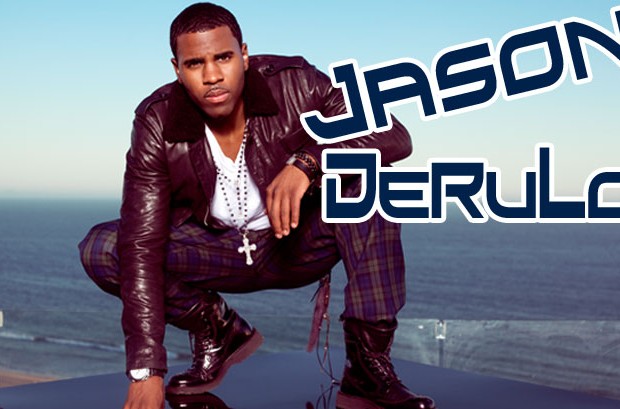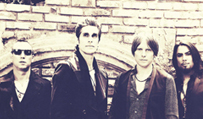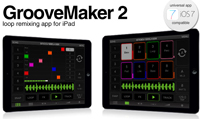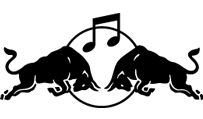by Jonathon Widran

Six years after he began writing songs in his mid-teens for Sean “Diddy” Combs, Danity Kane, Sean Kingston and Lil Wayne, Jason Derulo is a budding superstar in his own right, a hit machine with no pause button in sight. The Miami, FL, native was a smash out of the box in August 2009 with “Whatcha Say,” which hit No. 1 on the Billboard Hot 100and sold 3.6 million copies. That and his follow-up single “In My Head” (which reached No. 5) set the stage for the release of his 2010 self-titled debut album, which peaked at No. 11 on the Billboard 200 and spawned another Top 10 hit (“Ridin’ Solo”). Generating a total of 9.6 million in singles sales, and scoring a No. 2 hit as a co-writer of Iyaz’s No. 2 hit “Replay,” Derulo won two BMI Pop Music Awards earlier this year: Songwriter of the Year and one of the 50 Most Performed Songs of the Year for “Replay.”
Released at the end of September, six days after his 22nd birthday, Derulo’s new sophomore set Future Historyincludes the singer’s two current singles, “Don’t Wanna Go Home” (which spent five consecutive weeks in the Top 10 at pop radio) and “It Girl,” which also achieved Top 5 on the U.K. singles chart. The video for “Don’t Wanna Go Home” racked up more than 26 million views on YouTube; the artist’s dedicated channel on the site has streamed more than 395 million total views, ranking it in the Top 100 All-Time Most Viewed Channels..
Derulo was discovered by producer J.R. Rotem, who signed him to his Beluga Heights Records, which later became part of the Warner Music Group. Rotem produced his debut and contributes production on Future History along with hit makers Claude Kelly, Emanuel “Eman” Kriakou and RedOne. Derulo’s live performance history includes a six-week stint with Lady Gaga on her Monster Ball tour of North America and a jaunt in support of the Black Eyed Peas in Canada.
Music Connection: You had three massive hit singles from your debut album right out of the gate. Did that create any pressure for you when it came time to start work on Future History?
Jason Derulo: No it didn’t. I was more excited about doing the follow-up than anything. It was great to finally have this huge platform to share my music. I worked on getting to that point for a long time. Music is my whole life. I love to be in the studio, love writing, love performing. I’m loving life based on having that platform.
MC: Your manager Frank Harris says your first hits came so fast that no one got to know who the real Jason is, beyond just being a great hitmaker.
Derulo: I agree with that. On the first album, I was only 19 when I wrote and recorded it. It was me just making these great songs and sharing what was on my mind then. They came off super fast and I got caught up in the whirlwind where people knew the songs but not the artist. Future History is more of an open book. I’m not afraid to say anything. I’m speaking on my life experiences and letting them out. It’s not just good songs but songs that are a representation of who I am and how I deal with my life. My thinking goes, I’m going to have to perform these songs for the rest of my life, so it’s best that each holds a piece of my life and history in it. It will never be work to bring them back and sing them no matter how much time passes. They will always be fresh.
MC: We heard that when you were recording at Serenity Studio in Los Angeles, you created a vibe to inspire the writing process. Something about dimly lit candles. What kind of difference did it make?
Derulo: My vibe is all about music that’s sexy, like when you walk into room somebody is about to have a date in here. I wanted to create a vibe that would get me in the mood and make me comfortable. Certainly, I can work in other conditions, but if you have the means to make a comfortable place, like a sanctuary, you can create a vibe for yourself. I learned about this from 7 Aurelius (now known as Channel 7), who apparently got it from Prince. It’s a super vibe thing that allows the artist to have a dedicated space and a clear mind, which leads to a better creative environment.
MC: What is the biggest difference between your first album and this one, and where do you see yourself going in the future?
Derulo: The biggest difference is my growth as an artist and writer and man—most importantly as a man. The music is more edgy, and that’s a reflection of my emotional side, the grown-up and sexual side of me. All of these things are due to my growth as a person over the past few years.
I will always be first and foremost a songwriter. Even when I bring in other great writers to work with me, the songs I record and perform will always represent me and my life. I love all kinds of music and there are many different influences on the album, from R&B to rock and Euro-dance. If you love a lot of different kinds of music, chances are you will like Future History.
MC: How do you decide which writers and producers to work with?
Derulo: Being a fan of their previous work is the first thing. Then they’ll come into the studio and within the first 20 minutes I’ll know if it’s going to be a fruitful and long lasting relationship.
There have been instances where there’s an ego clash and things don’t work out, but I can’t let those encounters drag me down or ruin my vibe. I prefer to work with the writers and producers I enjoy being with. The process has to be fun and not feel like hard work. Making music isn’t just about a business relationship, but about joyful connections. Sometimes it’s magic, and sometimes it just doesn’t click.
MC: The song “Don’t Wanna Go Home” includes snippets of “Day-O (The Banana Boat Song)” and “Fight For You” draws on Toto’s “Africa.” How and why did you pick those classic songs as foundations for these new tracks?
Derulo: It’s all about loving the original song and starting an experiment with it. I think with “Day-O,” I wanted to create something that would feel like an escape for people from all the troubles in the world. If you’re having problems at home, “Don’t Wanna Go Home” can make you forget them. I think “Africa” is one of the most brilliantly written songs of all time. The melody is incredible and was fun to work with. These were just two songs that inspired me to build on them.
MC: The last song, “Dumb,” is one of the strongest tracks both lyrically and vocally on the new album. It’s also kind of somber. Was it inspired by any significant event?
Derulo: It was inspired by a breakup. When you go through a traumatic experience, you go through different phases. Sometimes, you laugh at it when it’s not funny, or you are in disbelief or there’s the feeling of blaming yourself.
I remember saying to myself that it was my fault, and I used that feeling to write the song. I remember telling J.R., who co-produced the track, not to put any drums on it. I wanted to let the lyric and vocal breathe and let the emotion just fly rather than dilute it.
MC: Although many compare you to Usher or Chris Brown, one major difference is that you’re a songwriter first and foremost. You won BMI’s Pop Music Awards Songwriter of the Year. What is your songwriting process? Is it harder for you to write now?
Derulo: Actually it’s easier now! Songwriting is a muscle. If you continue to work it, it becomes more of a part of you. I’m always working that part of me. The writing process is pretty basic and starts with me going into a booth by myself and having the engineer push “record.” I go off on emotion. There’s nothing else, just me speaking into the mic based on what I’m feeling or was feeling at one point, and let ‘er rip. It’s almost like an actor getting into character, getting in touch with myself on a deeper level.
MC: You started your career writing with Southern rapper Birdman and then artists like Sean Kingston, Lil Wayne, Cassie and Danity Kane. Did you like working behind the scenes or was the plan to evolve into a solo artist? How did you make the transition?
Derulo: It just kind of happened. There was no grand design except for the fact that my goal was to become an artist from the beginning. I made a demo for myself to try to get a deal, but none of the producers who had made a name for themselves wanted to work with me. They were all trying to get with major artists. I didn’t have the money for them to produce songs for my demo, so I told them I was also a songwriter and I would be willing to write for different people. I made a demo of my songs myself and they started getting placed. Success as a songwriter happened almost by mistake.
MC: You were part of Lady Gaga’s Monster Ball Tour in 2009-2010. What were the best and most challenging aspects of being part of something that big?
Derulo: The best part of it was the opportunity to perform on a huge tour. You have this massive stage, and when you open for people it’s almost like training wheels or a stepping stone before you can have your own tour. Artists do it for the exposure because we’re not getting paid crazy amounts of money. If I did club dates I’d have made more money. But playing on a huge tour prepares you for what comes next. Gaga once opened for New Kids on the Block, remember?
You have to take the proper steps. I got to watch how a huge tour works, including how the crew builds a set and puts up and works the lights. As I was watching all these things, I had a vision of what my show would be like someday. It became more of a physical and tangible reality for me.
MC: Warner Bros.’ marketing strategy for Future History includes a lot of fan-focused live events, including a concert at JFK Airport in New York and a flash mob with the New York Knicks. Were you a part of creating those events?
Derulo: Yes. I never do things unless I think the situation is cool. A whole team of us were part of the planning of these events, which was based on fun things we thought my fans would enjoy as part of the launch of the album.
MC: Everyone talks about your amazing work ethic. What instilled it and how do you stay focused?
Derulo: I think I was just blessed with a desire to succeed at this, and that’s the bottom line. What drives me is my desire to achieve great things that are based on helping cheer up someone’s day and making them forget their problems. If there’s something I can do, why not do it? I’ve been working at this a long time, and I’ve reached a special point in my career I call a new beginning. I think my work ethic is my best quality as an artist.
MC: Do you have someone who you rely on to help you get a perspective on your career decisions?
Derulo: My manager Frank Harris. We’re a team and we decide everything together. I’ve known him since I was 12. He was a law student at the time who was helping me improve my basketball skills.
MC: How do you classify yourself musically? It seems like on Future History you have expanded more into the upbeat dance-pop sound and are trying to get away from being a strictly R&B singer or balladeer.
Derulo: I don’t classify myself. I just like different types of music and say that I’m an entertainer and a musician. I studied classical music for a long time and I also love jazz. I read music, too. There are a lot of different genres on this album. It’s hard to place it into one genre. Pop just means popular, so I guess we can call it that.
MC: Is there any kind of music or artist you’re into that many of your fans would find surprising?
Derulo: I don’t think they’d find it strange that I love Madonna and Prince. Maybe Elvis and Ella Fitzgerald. Those icons are my biggest influences.
MC: Is there something on the album that you’re especially proud of, something subtle that you worked hard to achieve?
Derulo: One of the production details I really like on the album is the African chant we added to “Fight For You.”
MC: Do you have your own publishing company? Does it seek opportunities for your music––licensing, placements in movies?
Derulo: My publishing company, called Future History, is affiliated with Rondor Music. The Fliptones are signed with my company as well. Yes, the company seeks out licenses for placements. A lot of it lately has been aimed at dance shows and reality TV.
MC: Do you feel competitive with other artists in your genre? And does the label exert any pressure on you to sound like what’s selling now?
Derulo: Record labels always want to go with what is working on the charts, because they want their artists to be successful. And i understand that they are investing a lot in us artists.
As for me, personally I just want to make music that my heart desires. If I start worrying about sales and chart positions and try to fit myself into a specific mold, that’s when this would stop being fun. I might lose that passion I have for making music and I seriously never want that to happen. It’s my life.
MC: Is it tough for a young artist to be himself when trying to stay creative and true?
Derulo: At the beginning of making this album, the A&R guys were trying to put their hands on it, but I just asked them to let me do my thing. I’m proud of that. I’ve heard stories about artists who let their labels take too much control and it messed up their vision. I wanted people to trust me and I am happy they did.
MC: How do you feel about the direction of pop music today? Should artists follow the trends?
Derulo: The direction of music is ever changing. I love turning on the radio because there’s a lot of good stuff from great artists out there right now. It’s always exciting to hear new music. Artists should be aware of what’s out there, but I think songwriting is a personal thing that should come from the heart. That’s where it all starts for me.
Contact jill.augusto@wbr.com













